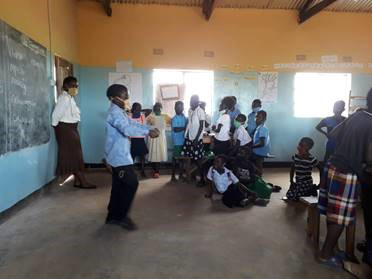The Zambia eSchool 360 Expansion Project: A Program That Aims to Improve Education in Zambia
The current Zambian educational system is neither providing the access to nor the quality of education that its students and communities need. Literacy rates among young adults ages 15-24 are only 58.5% for females and 70.3% for males (UNICEF, 2014). Education is a greater challenge in remote villages where there are no schools or the existing infrastructure barely meets minimal standards.
AIR is working with Impact Network to expand its eSchool 360 program to 35 such rural schools in Zambia. The program aims to deliver higher quality, low-cost education to children in primary grades through a holistic technology solution. The model equips teachers with a Mwabu tablet and a projector and uses an interactive curriculum that moves away from traditional rote learning. The tablet contains thousands of preloaded lesson plans that adhere to the Zambian national curriculum, are approved by the Ministry of Education, and are taught in the local language. A continuous coaching and training program helps teacher improve their pedagogical and technology skills. Professional staff support every school, providing accountability, onsite support, and training.
 This initiative has been funded through AIR’s Board, whose members most recently visited the pilot program in Zambia in the spring of 2023. AIR is providing resources to improve school infrastructure, bring solar energy, equip and train teachers, and field test a biometric attendance tracking program for students and teachers. Furthermore, technical assistance is helping Impact Network to build their capacity to manage larger grants for scale-up. These efforts will bring a quality education to an estimated 3,500 additional children in 35 schools across three districts of Zambia’s Eastern Province.
This initiative has been funded through AIR’s Board, whose members most recently visited the pilot program in Zambia in the spring of 2023. AIR is providing resources to improve school infrastructure, bring solar energy, equip and train teachers, and field test a biometric attendance tracking program for students and teachers. Furthermore, technical assistance is helping Impact Network to build their capacity to manage larger grants for scale-up. These efforts will bring a quality education to an estimated 3,500 additional children in 35 schools across three districts of Zambia’s Eastern Province.
A previous analysis by American University suggested that the eSchool 360 model costs 70 percent less than the education the government provides. In addition, Impact Network schools showed improved reading and math outcomes that were equal or better than their peers at government and community schools. However, the study was not able to demonstrate causality. To determine the impact of the program using a more rigorous evaluation, AIR will also design and implement a cluster-randomized controlled trial to determine the impact of the program on children’s learning outcomes.
